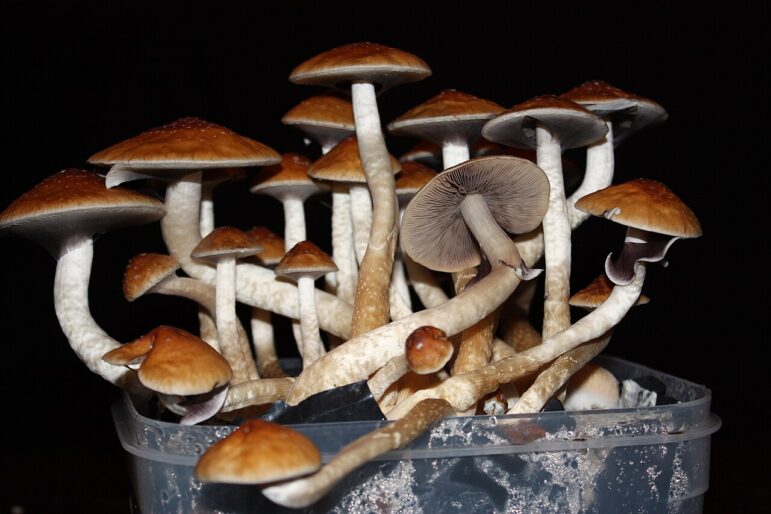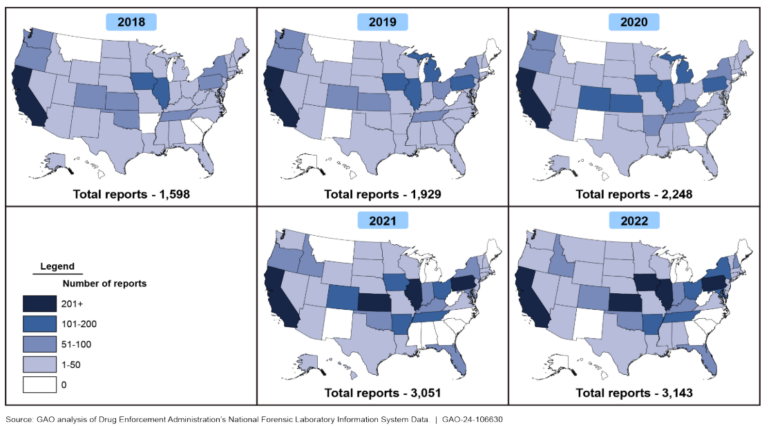WASHINGTON – The Government Accountability Office (GAO) released a report last week stating that the Drug Enforcement Administration (DEA), under the Department of Justice (DOJ), should enhance and improve the process for granting religious exemptions for psilocybin and other controlled substances. The current procedure lacks clarity regarding timing, evaluation criteria, and other key aspects.
The GAO is an independent, nonpartisan agency that works for the United States Congress, providing auditing, evaluation, and investigative services for the federal government. Often referred to as the “congressional watchdog,” the GAO ensures that government operations are efficient, effective, and accountable to the public. It also offers input on policy decisions and suggests corrective actions.
The DEA is responsible for investigating and enforcing violations of the Controlled Substances Act, overseeing the study of controlled substances in coordination with the Food and Drug Administration (FDA), and reviewing petitions for religious exemptions to the Controlled Substances Act. Historically, psilocybin has been used in Indigenous cultures for spiritual ceremonies. Some states have legalized adult use of psilocybin or established programs to study its therapeutic applications.
The Joint Explanatory Statement accompanying the Consolidated Appropriations Act of 2023, includes a provision for the GAO to review the use of psilocybin. This report addresses, among other objectives, (1) what federal data show about psilocybin enforcement, and (2) reported barriers to legal access and use of psilocybin for religious practices under the Religious Freedom Restoration Act (RFRA).

Psilocybe cubensis “Golden Teacher” kookoskuidussa. [Photo Credit: Mädi CC BY-SA 3.0]
The GAO analyzed DEA data related to enforcement and religious exemption processes, and interviewed officials from the DEA, FDA, research institutions, selected individuals from law firms and advocacy organizations, and officials from two states that legalized psilocybin use. The culmination of the GAO’s work is an 80-page report noting that although psilocybin remains a Schedule I controlled substance (the most restrictive classification, identifying a substance as dangerous, lacking medical use, or highly addictive) under the Controlled Substances Act, individuals can petition the DEA for exemptions to use it or other controlled substances for religious purposes.
In 2019, the DEA began a rulemaking process for petitions for religious exemptions, but the GAO report notes that “there is no timeframe for issuance of the notice or final regulations.”
While some petitioners have accused the DEA of delaying decisions on special drug-related exemptions, the new report is significant because it shows the federal government itself is now criticizing the DEA.
Drug Control: DEA Should Improve Its Religious Exemptions Petition Process for Psilocybin (Mushrooms) and Other Controlled Substances https://t.co/bASkVkNk6Y
— U.S. GAO (@USGAO) May 30, 2024
The GAO specifically examined psilocybin use under the RFRA, which aims to protect religious practices from undue government interference. The GAO noted that the DEA’s exemption procedure was burdensome.
“DEA has established a process for these petitions, but its guidance doesn’t set clear timeframes for the decision-making,” the GAO wrote. “Exemption petitions have taken from 8 months to over 3 years to be resolved.”
“Selected stakeholders reported several barriers to the legal access and use of psilocybin for religious practices under the RFRA,” GAO says. “For example, DEA established a process for parties to petition for a religious exemption from the Controlled Substances Act to use controlled substances for religious purposes. However, DEA’s guidance does not inform petitioners on its timeframes to make determinations on completed petitions.”
The GAO’s investigation found that “over an 8-year period—from fiscal year 2016 through January 2024—DEA reported that 24 petitioners requested a religious exemption for various controlled substances.” The report underscored that “as of January 2024, DEA reported that none of these petitions had been granted an exemption.”

Number of Psilocybin-Related Reports Voluntarily-Reported by Forensic Laboratories by State, Calendar Years 2018 through 2022 [Source: GAO]
“The three pending religious exemption petitions related to psilocybin ranged from about 8 months to over 3 years from the date of receipt,” GAO wrote. “DEA’s information also showed instances where finalized actions regarding exemption petitions related to other controlled substances have been pending a determination for an extensive period—one almost 5 years and one almost 8 years.”
To address these issues, the GAO made four main recommendations:
- DEA should “more clearly communicate the types of information that the Religious Freedom Restoration Act petitioners should provide to allow DEA to evaluate petitions for religious sincerity.”
- The agency should “more clearly communicate the standards and relevant factors” when making a determination.
- DEA should “establish timeframes for DEA to make determinations on completed religious exemption petitions.”
- DEA should provide “information for petitioners to be able to receive updates on the agency’s process related to exemption reviews.”
The GAO concluded, “Clearer guidance could also strengthen the quality of reviews, increase trust among stakeholders and petitioners, provide transparency in the process, and clarify and identify DEA’s standard petition review processing times for exemptions from the Controlled Substances Act.”
As for the next steps, the GAO said it will provide updated information when it confirms what action DEA will be taking.
The Wild Hunt is not responsible for links to external content.
To join a conversation on this post:
Visit our The Wild Hunt subreddit! Point your favorite browser to https://www.reddit.com/r/The_Wild_Hunt_News/, then click “JOIN”. Make sure to click the bell, too, to be notified of new articles posted to our subreddit.